The results of the home-school experiment
(Home-school update - Part II)We all arrive in this world with a certain level of curiosity, and that curiosity will be directed according to an individual’s own particular character or bent. The art in teaching children is to stoke their curiosity.
As anybody who has ever had charge of a capricious wood-stove will know, if one is clumsy or over-enthusiastic and dumps too much wood onto the flames then they can easily be stifled; but, on the other hand, if one kindles the fire carefully with dry leaves and appetising little sticks then it will soon leap up, and eventually it will be burning so greedily that it will even gobble up damp logs.
So it is with kids. If you start them gently, with stories about things which they find fascinating, then their desire for knowledge will grow until, eventually, they might even swallow down calculus and Greek verbs.
Education is not the learning of facts but the training of the mind in how to think
— Albert Einstein
Finding the balance between offered opportunity and coercion, or between freedom and neglect
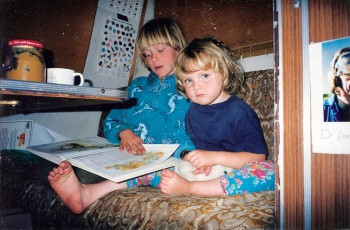
In the first part of this update on our home-schooling adventure I emphasised the fact that the only worthwhile and effective kind of teaching is one which provides answers to our own, individual curiosity. Just as children should not be fed things that they don’t want to eat, so they should not be made to learn about things which don’t interest them. However, this is not to say that I never made my three children do things that they didn’t want to do. There are some things in this life which a person simply has to learn – not snippets of knowledge, mind you, but life-skills – and it seemed to me that if the ground was hard I should nevertheless keep digging away until the skill was forced to take root.
What particular abilities do I have in mind here? Well, in the broadest sense I guess we could say that talking, walking, and using the potty are life skills… but these, I knew, would take care of themselves without my interference. All that the child needs here is a role model to follow.
Likewise, teeth-cleaning and hair-combing ought surely to be eagerly copied by the child… And so, too, the habit of washing the dishes every morning…
Dream on! Kids don’t generally pick-up quite so readily on these particular skills. I guess they soon recognise that they’re not really essential. (What seven year old cares if his hair is matted and the plates are dirty?)
Nor are our children necessarily enthusiastic about learning the skills which we know as The Three Rs – and these are the ones that I have in mind at the moment, and the ones which, it seemed to me, I must hammer into the ground. At its simplest level, the purpose of an education must be to provide the child with the tools necessary to educate himself – and reading, writing, and arithmetic are the principal tools.
It is, in fact, nothing short of a miracle that the modern methods of instruction have not yet entirely strangled the holy curiosity of inquiry; for this delicate little plant, aside from stimulation, stands mainly in need of freedom. Without this it goes to wrack and ruin without fail.
— Albert Einstein
All three of my children loved to read and were reading alone from an early age. But whereas Caesar grasped mathematics without any difficulty and was adding and subtracting at the age of three, for his sisters ones and tens were a mystery and multiplication was a nightmare. And whereas Xoë always loved to write, and from the age of five turned out epic stories and four page essays, Caesar could spend all morning with his pen in his hand gazing at a blank piece of paper.
Because I, too, was mathslexic as a child – to the extent that I would seem to see a brick wall appearing in front of my mind whenever I was faced with a column of numbers – I understood my daughters’ problem. When their eyes glazed over I knew that there was no point in pushing them. Comprehension would arrive eventually, and in the meantime it was best to let the ground lie fallow. Heavy-handedness would only cause damage.
But when Caesar, although able to hold a pen and shape letters, failed to produce coherent sentences – or, indeed, any sentences at all – I was absolutely appalled. Words flow as easily from my pen as thoughts from my mind. Caesar had thoughts – he expressed himself well using the spoken word – so, why the heck wouldn’t he write?
It seemed to me that Caesar must just be day-dreaming. And so I decided that, for his own sake, he must be made to write.
The three Rs most definitely are the key to education; this, I still believe. Once a person has these skills under his belt – and once he has been taught how to research his field of interest and record his learning and his thoughts and ideas – then the world is his oyster. But whether the requirement to install this software justifies the use of force… On that score I am no longer so sanguine.
While his six-year old sister created rabbit, cat, or snake-shaped books (about rabbits, cats, and snakes) and wrote a forty-page story about a family of children who stole a yacht and went sailing round the world, her big brother was compelled to sit nearby and write about steam engines, light-emitting creepy-crawlies, and whatever else had his attention at that particular juncture. And he hated it.
Oh, the reading and research which preceded the production was fine, but the writing was hell – or so it seemed. At the age of eight Caesar could spend four hours writing two and a half sentences. And he could even pause, for half an hour, not just in mid-sentence or mid-word, but in the middle of writing an individual letter!
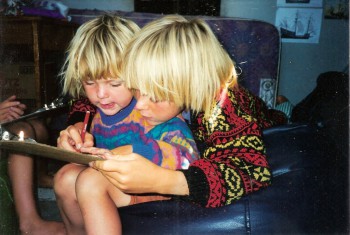
In retrospect, it is perfectly clear that I should not have asked quite so much of this child. Or rather, I could have asked all I liked of him so far as maths was concerned (already, by this age, he found long-division an absolute doddle, and by nine he had overtaken me and was having lessons in trig from a friend) but I should not have asked him to produce a page of writing each day. Having kept logbooks and written poems from the age of six I simply assumed that all kids, if they made the effort, ought to be able to do the same.
In retrospect, I should have given Caesar a short text to copy, or dictated a few sentences to him, thereby slowly and gently awakening the dormant seed of literacy. I should have allowed Caesar much more time to build Lego Technic rain-powered cars, and sparklers, and tree-houses; then he might, perhaps, have gone on to design fuel cells, and super-efficient solar panels, and such like. Who knows…?
Happily, the delicate little plant was robust. Or perhaps it is simply that these home-schooling classes took place on a thoroughly irregular basis, the greater part of the children’s day being spent in climbing trees, catching fish, swimming, and playing hide-and-seek.
Whether because of my efforts or (more probably) despite them, Caesar is now a very good writer, able to express himself fluently on subjects which are of interest to him. At the age of 16 he scored an A for his English Literature GCSE. Regardless of this success, should I be so fortunate as to have the opportunity to home-school my grandchildren, some day, I will be much more respectful and understanding, not just of their interests but of the nuts and bolt and mechanisms of their individual minds.
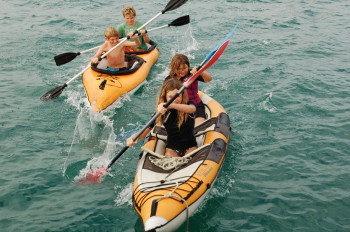
Interaction institutionalised v. Free-range relationships
By now you’re probably starting to wonder about our children’s ability to socialise with their peers. If they didn’t go to school how did they get the chance to mix with other kids?
School is, in fact, a very odd environment for social interaction. The playground affords the only real opportunity for discussion, and so forth, and even then the interaction takes place within the confines of the institution. Find me a situation in the natural order where children are sub-divided into categories according to age and are encouraged to communicate only with the other members of their particular group. Find me a situation where the elders are so isolated from the younger members of the tribe.
The nearest comparison really is with a prison, is it not? Enforced separation into manageable groups; the majority brought under the control of figure of authority who is often despised; strict routines; compulsory confinement.
The natural order has people of all ages mixing together freely. In an African village the kids frequently join in with the adult chores, and when they do take themselves off to play they go as a gang, with the littlest ones riding on the backs of older brothers and sisters. This is also the order amongst cruising yotties – and, in my experience, amongst all small, unregimented communities. Left to their own devices cruising kids muck in with whoever happens to be around. Our three never had any trouble making friends with children who were either younger or older than themselves, and nor were they ever uncomfortable amongst adults. When they were small they were happy to sit quietly, and listen and learn from the conversation of their elders – although what they learnt may not always have been the topic which was under discussion… From their middle-teenage years they were sufficiently knowledgeable and self-assured to contribute their own opinions and ideas. I may say that, from what I have seen – and from what I recall of my own teenage years – this ability to socialise and engage in meaningful conversation with people of all ages and all backgrounds is seldom to be found amongst teenagers whose upbringing has taught them to operate only within age-segregated units.
You send your child to the schoolmaster, but ’tis the schoolboys who educate him.
— Ralph Waldo Emerson
Sadly, there are not very many families cruising the world at the moment, and so the opportunity to interact with other Sea-Thing kids is not always available. When we arrived in the island of St Helena, in the South Atlantic, it was several months since our little hoodlums had had the chance to play with their own kind and so, in an effort to remedy the situation, we enrolled the older two in the local schools.
For Caesar, then aged 11, this entailed getting on a strange bus all by himself, and heading off to a previously unseen location in the middle of the island. While it is small by British or American standards, Prince Andrew’s School was outside anything that our boy had previously experienced. 600 teenagers thronged its concrete corridors and swarmed around the concrete classrooms, and all of them were babbling away in a funny accent. Caesar was the one foreigner in the place. And, now that I come to think of it, he was also the one white child. Since we had just arrived from Africa the coffee-coloured people seemed, to us, to be much like ourselves; but to the Saint Helenians the one pure-blooded Anglo-Saxon must have looked positively anaemic! (The Saints are largely of Anglo and East-Indian mixed descent, with a little bit of African thrown in for good measure.)
Things were rather easier for Xoë. She had only just turned 10 and so she could still attend the little school in Jamestown, just a few hundred yards from where we were anchored. Since Xoë has always been gregarious we expected that she would love school – indeed, we feared that she would never want to leave! – but although she enjoyed playing football with the boys in the playground and had fun writing plays for her fellow students to perform, she absolutely hated the lessons. The demands made on her intellect were so low that she was bored out of her mind. Within ten days she was begging to be allowed to leave.
Back aboard Mollymawk she wrote songs, discovered Shakespeare, and – between times – enjoyed dressing up, swimming, climbing the mast, and so forth. Already she had outgrown the need to have any kind of set lessons, and my input was minimal. In essence, I provided ideas, information (on request), and a constant supply of new reading material. Oh, and I also provided sums, now and then – and got bitten for my trouble.
Caesar stuck it out at school for a few weeks longer. Being of an eminently laid-back disposition he was perfectly content to sit and gaze out of the window while his peers learnt long division; however, in the end he got tired of being teased because he had never played soccer and didn’t want to try. He left, very much the wiser for his experience. It taught him exactly what it was that he’d been missing…
After his return, the Terrible-Two would spend their afternoons rampaging around the little town: exploring old ruins, climbing the castle wall, crawling through the culvert which passed under the high street, and capturing pigeons which would then be housed temporarily in a vast aviary constructed from cardboard boxes on the aft deck. For a time it must have appeared to others in the anchorage as if the big yellow boat had squatters living on the aft deck. Fortunately, the shanty-dwelling fell apart, and the pigeons departed, during a heavy rainstorm.
A child educated only at school is an uneducated child.
— George Santayana (Spanish philosopher and novelist)
Xoë had one more brief taste of formal education while we were in Spain. Again, she enjoyed the social side of things but detested the boredom and despised the teachers. (In St Helena she had taken the opportunity to correct her form-teacher’s knowledge of the island’s history, having just read a book on the subject. In Spain she made trouble for the English teacher, who once held up what she told the class was a “shit of paper”. Tact has never been Xoë’s strongest point.)
I received the fundamentals of my education in school, but that was not enough. My real education, the superstructure, the details, the true architecture, I got out of the public library.
— Isaac Asimov (American writer)
Can home-schooled kids make the grade, academically?
These brief experiences apart, my children were entirely un-schooled – which brings us back to the original questions, posed at the start of Part I of this article: Did they pass their school exams? Did they qualify for university? And what are they doing now?
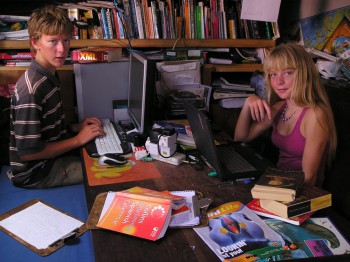
The answer to the first question is yes. Despite being rushed through them at only six months’ notice, Caesar and Xoë both got a full set of A grades for their GCSEs – the exams taken by British school children at the age of 16. Xoë was taking the exams two years early, at 14, but she scored just as highly as her big brother.
Despite the difficulties inherent in studying at long-distance, using correspondence material which was often inadequate and with tutors who were sometimes inept, the kids also passed their A-levels – which are the exams taken, two years after the GCSEs, by British school children who want to go to university.
A gentleman need not know Latin, but he should at least have forgotten it.
— Brander Matthews (American writer and teacher)
Caesar elected to take three A levels, which is the standard number for a bright student. He had no particular wish to go to university – and his parents, I may remark, had no particular wish for him to take the exams. It seemed to us that they would cost him a lot, in terms of effort and loss of fun-in-the-sun, and would serve no ultimate purpose. However, we kept this thought to ourselves and provided the necessary support.
In order to get through the work Caesar had to spend every day, for months on end, with his nose to the grindstone. He did not appear to enjoy his studies and, meanwhile, the sun shone down, the water sparkled… the diving kit and his windsurfer called out to him.
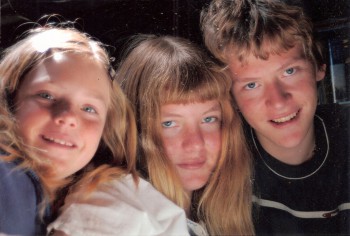
Xoë was much more ambitious than her brother. Despite the fact that she was taking the exams two years before she needed to (at 16 instead of 18) she decided to sit five A levels. This was truly a colossal undertaking – very few school-goers take even four A-levels – and it was not one which we encouraged; although, again, having given our advice we then accepted Xoë’s decision and supported her in her goal. Her chosen subjects were English Literature, History, Classics, Spanish, and Latin. The Latin she chose to take regardless of the fact that she had never previously studied a word of that ancient language. Her long-distance tutor was of the opinion that no one, in this situation, had any hope at all of passing the exam… but Xoë was undaunted; indeed, she pretty much told the man to mind his own business and get on with the job for which he was being paid. That’s my girl!
Whereas, while the kids were studying for their GCSEs, I had driven them with a tongue like a whip, now I stood back and let them get along as best they might. This, as I see it, is all part of the learning process. If you’re going to go to university you need to know how to discipline yourself.
Caesar, as I have intimated, was not as diligent as he might have been, but Xoë was phenomenal. Throughout the 18 months which were available to the kids for these studies Xoë rose every day at five o’clock, sat herself down at her desk, and worked. Throughout that year and a half she did absolutely nothing except work. And very grumpy about it she was, too!
Believing that no play whatsoever makes the mind dull, we once managed to lure the scholar into the water – but only once! Throughout the rest of that time she drove herself along with an almost manic fervour.
In real life, I assure you, there is no such thing as algebra.
— Fran Lebowitz (American author)
The standard requirement for entry into a British university is three A levels, but there is also one other qualification needed – a GCSE in mathematics. Whereas Caesar had taken this exam along with his other GCSEs, Xoë had not. Maths, as we have seen, is her bête noir. When presented with a simple sum she used to rant and rage in a most spectacular fashion. Thus, at the age of 16 she could still barely cope with such things as dividing 1,346 snails amongst 23 thrushes.
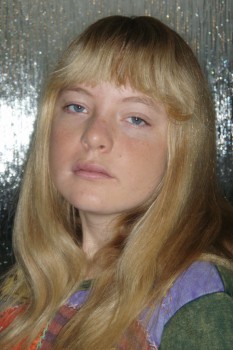
Whereas Caesar didn’t much care for the idea of closeting himself in a university, Xoë had decided that she was going to go to Oxford or Cambridge (England’s top universities). However, without a GCSE in maths she would not even be able to get into one of the lesser institutions. So, what did Madam do? Why, she sat right down and studied mathematics, of course.
Knowledge has a different taste, depending on whether it is being shoved down our throats by some well-meaning somebody or is something that we crave. A subject which once made us gag can seem like a treat when sugar-coated with our own choosing, and so it was for our stubborn scholar. Xoë gulped down the lessons in algebra, fractions, square roots, and all that other stuff which will never stand her in good stead ever again, at any time in her life – (this I know from my own experience as another right-brain scholar who also had to drive herself through the same maths curriculum, many years before) – and she passed the exam.
Each A-level subject entails up to eight exams, and in the normal course of events English children sit half of these exams at the end of the first year of their studies and the other half at the end of the second year. Since the exams can only be taken in England (under strict supervision) and since we didn’t have a lot of money to spare for flights, we suggested that Caesar and Xoë sit all of the exams at one go, at the close of their studies. This was, indeed, the recommendation given by one of their correspondence tutors – but it was bad advice. In the course of little more than one month Xoë had to take 40 exams, often sitting two on the same day. The pressure was immense, and on a couple of occasions she forgot which subject she was about to be grilled in until the paper arrived in front of her.
Unfortunately – predictably indeed – Xoë did not get good enough grades in all five exams to enable her to apply for a place at Oxford or Cambridge. She got two A grades, in English and Latin – yes, she scored top marks in the exam which, according to her tutor, she could expect to fail – but for the other exams she only scored a B.
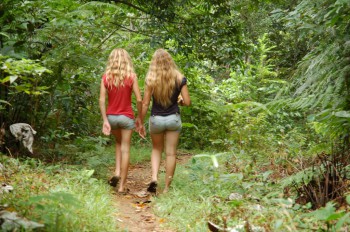
Since she was still only 16 years of age Xoë could have re-sat a couple of the exams a few months later; but Xoë is as Xoë does. Although I tried to help her to see that she had attempted the impossible, and that her “failure” was actually an amazing accomplishment, she refused to listen. That was that; she was done with academia.
She sailed with the rest of us on our circuit of the North Atlantic; she taught herself to play the guitar – and taught herself music theory, from the internet – and then, eventually, growing bored of the leisurely life, she began to recover her nerve. She would still not hear of the idea of taking up where she left off; she was not interested in re-sitting a couple of her A-levels and qualifying for Oxbridge. Instead she opted for a laissez-faire approach and applied to various London universities.
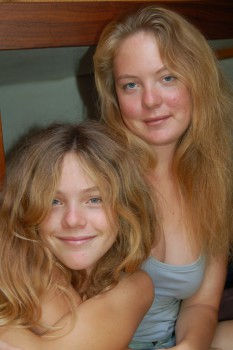
Needless to say, they were all eager to have her – so far as the run-of the-mill unis were concerned, she was vastly over-qualified – and having made her choice she went on her way. She is now studying Creative Writing at Roehampton.
Caesar, meanwhile, turned his attention away from scholastic pursuits and towards things which are more in keeping with his bent. He qualified for his PADI Divemaster (but never got round to applying for the certificate…). He studied the theory for the RYA Yachtmaster’s ticket, passed the exam, and subsequently went on to gain the full qualification with commercial endorsement.
I have never let my schooling interfere with my education.
— Mark Twain (American author)
Taking time out from his travels aboard Mollymawk, Caesar also spent a few months working with Raleigh International in Central America. This was actually his first opportunity, in many years, to see how he fitted in with his peer group en masse. Raleigh adventures are only open to youngsters aged between 17 and 24, and the majority of the participants are taking a gap year either before, during, or immediately after their university studies; thus, in a way, Caesar was back in that St Helena situation.
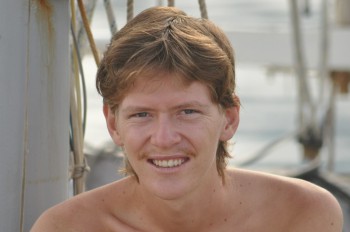
With a lifetime of travel behind him, and having spent plenty of time in peasant villages, Caesar found that he was better equipped than any of his fellow adventurers to deal with the vicissitudes of roughing it under canvas, hiking all day for days on end, and sharing an adobe hut with a family of foreign-speaking strangers. Indeed, whereas many of the other participants found aspects of their situation gruelling or awkward, he positively lapped it all up.
Many of his fellow operatives seemed to Caesar to be rather immature – but then what can one expect of kids who have been brought up inside the System? There was no opportunity, in the rainforest, for them to fulfil their urge to consume! During the last days of their sojourn in a Nicaraguan village the group discussed what they would do when they got back to civilisation. Watch the latest Harry Potter movie was top of everybody’s list; everybody except Caesar, that is. He didn’t want to leave the village where, he felt, they were just beginning to get to know the people.
The world is a book and those who do not travel read only one page.
— St Augustine (354 – 430 AD)
Having walked from the village and arrived in the comparative civilisation of the nearest small town, the Raleigh team were pleased to come across a café which sold hamburgers. But while his mates tucked into McDonald’s type fare, Caesar chose a dish of rice and beans – the exact same dish, in fact, that he had been feeding on for most of the past fortnight. The others rolled their eyes in horror!
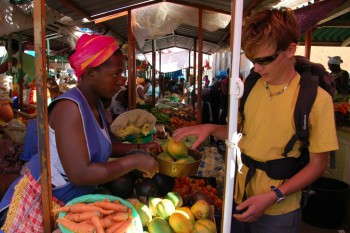
Note please, that this is not to say that Caesar didn’t fit in with his peers. He did. He got along perfectly well with everybody, and he remains in contact with several of his new friends. It is simply that whereas for most of the participants the Raleigh adventure was something extraordinary, and something quite challenging, for our boy it was simply a pleasant frolic in the forest. To a certain extent, this is the difference between a one-off, home-schooled child who has been educated to use his eyes and ears and to form his own opinions, and a production-line citizen who has been ordered to copy down what he is told. Clearly, it is also the difference between a person who has been brought up in just one locale and a global citizen. Travel really does broaden the mind.
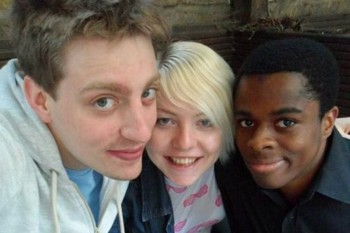
Xoë has been less forthcoming about her impression of her fellow students and her experience of slotting into the System. Perhaps she will write about it herself, one day. So far as academic matters are concerned, she continues to work hard – which is a thing that she loves to do – and she continues to excel. At the end of her second year she gained top marks in every discipline, and she was the only student on her course to do so. Who knows, perhaps she still has plans of one day heading for those “dreaming spires”…?
Xoë’s work has been featured on her university’s website and in one of their publications.
I know the answer! The answer lies within the heart of all mankind!
The answer is twelve…? I think I’m in the wrong building.
— Charles M. Schulz (creator of Snoopy)
Those of you who know the family will have noticed that someone is missing from this account. What about Roxanne? She has just turned 16. Is she, even now, diligently studying for her GCSEs?
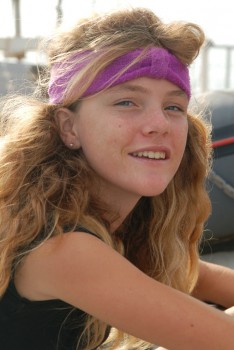
No. She isn’t. Having watched her big sister and brother devote three years of their young lives to gaining their exams, Roxanne has decided that she doesn’t want to follow in their wake; not, at any rate, at the present time. Xoë’s example has taught her that if, and when, she wants to go to university, then she can knuckle down to things, study hard, and obtain the necessary result.
Those exams are worth absolutely nothing in their own right – the knowledge which was needed to acquire them did not seem to us to be especially useful or interesting – and Roxanne therefore prefers to spend her days reading, writing, painting, cooking, and generally enjoying life. She is still very keen on wildlife but her interest has moved on from mere fascination with the creatures themselves to a desire to protect the environment – for the sake of all beings, whether six-legged, feathered, breathing through gills, or writing poetry.
When she needs qualifications she can go out and get them. But right now, she doesn’t.
So, did we do our job well, or have we failed our offspring? In the final analysis, only they can answer that question – and maybe they will, in a future article.

Wow, I’m excited. Thank you, for the detailed report. It is wonderful. It stands out as an example to encourage others to take matters into ones own hand. Here in Germany, we a forced to attend ten years in state sponsored and equally awfully state organized institutions and waste our precious drive, to really develop awesome people, full of joy and love. I always felt raped by that system. Your way of life is a reminder, of how wonderful and capable young people can become, when their own most inner being is respectfully allowed to blossom. The years to come will prove to doubters (but they wish they would have gone a similar way) that your children will earn a living, as in being able to support their lifes and make their dreams come true no matter what their hearts desire. I hope more people will hear of you all and take a leap of faith to trust themselves again. Thank you, in the name of many others you never hear of, but get inspiered by your lifes.
Uno de mis sueños en esta vida es conocerlos personalmente, los admiro profundamente , son un ejemplo para mi
Gracias Jill por compartir tu historia , tengo un hijo de 15 se llama Inka estoy seguro que serian muy buenos amigos con tus hijos
Un dia voy a tener mi pequeño catamaran y tal vez nos encontramos por la costa de Brasil
I love yo guys!!!!!!
Tus niños son bellos y muy inteligentes Jilll!!!
Thank you so much for sharing this. It really inspires me and let’s me hope that my children to come should be as free as yours. I hope they can pursue as much as they want. And from my experience, I think that all the titles and certificates are only worth the first look that people hiring you give them. That and nothing else. Grades don’t make you able, but what you can do, will define you in any job or endeavor.
All the knowledge that I use in my life I acquired outside of school and university. And it took me a new Masters study to realize again, that it is a waste of time and money to try to fit in the system.
I hope more people become aware of the truths I feel you and your children stand for. That knowledge is only worth something with curiosity and your own interest and will for self improvement. That the freedom and responsibility to acquire knowledge, should be your own.
I wish you all the best.
Thank you for your article.
It encourages me so much, since I am also un-schooling my child, not while sailing but while living in a city, a very schooled environment, where people don’t even have the notion of having an alternative to school – although it is legally permitted – and the pressure is high against us.
We grow in adversities and we enjoy finding companions in our journey who go through the wonderful experience of unconventional education – even if they aren’t next door physically.
Keep in touch 🙂
Many thanks to everybody for your kind comments, both here and on our Facebook page; and good luck to all of our fellow homeschoolers. If anybody were ever to ask me,”What’s the best thing you’ve ever done in your life?” the answer would be, home-school my kids. I’m certain it was the best thing for them, and it also turned out to be a wonderful and rewarding experience for me to!
I am a little late to the show! But I’d love to read an update on how/what they are all doing now. What did Roxanne decide to do?
Regards
Hayley (a fellow home educator)
Roxanne is still deciding what to do…. 🙂